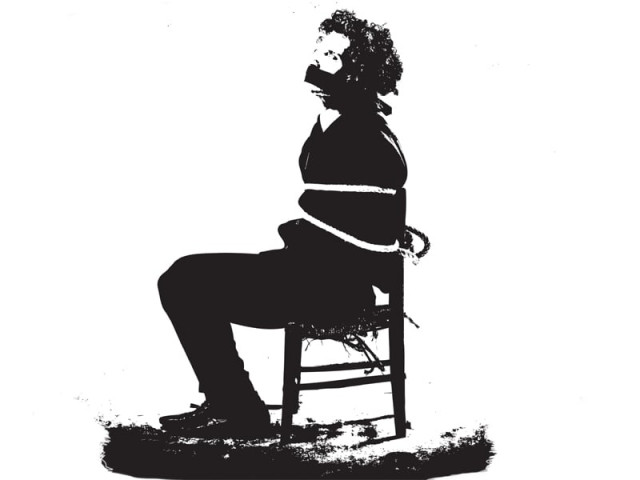‘Crime ethics’ of kidnappers
Kidnapping has become a sort of illegal business in Pakistan, having a specific work ethic.

Kidnapping has become a sort of illegal business in Pakistan, having a specific work ethic. DESIGN: ESSA MALIK
Kaleem, a businessman, was picked up from Karachi’s outskirts a couple of months ago and taken to an unknown location. “I wept and cried before my kidnappers that I had no enmity with anyone, I never exchanged even harsh words with anyone and no one in my family had political affiliation. I asked them: why are you doing this to me? But they did not answer,” says a traumatised Kaleem as he recalled fearful moments.
They put him in a small cell having, for ventilation, just a small out-of-reach hole in the wall.
“For the first two days, they did not say a word to me nor did they reply to all my babbling. My fear grew with every passing day. The questions that kept coming to my mind were: ‘What do they want with me? Will they shoot me? Or slit my throat? Will my family find me as a headless body in a sack?’ On the third day, however, they asked for my family’s phone number to ask them for ransom,” he said. He was released after negotiation with his family. The original demand was Rs1.5 million but it went down to Rs500,000, the sum they eventually got. “I could not believe it when they released me in the street and giving me Rs200 for rickshaw fare. I was still living in a dream,” he said.
Now that he is free, Kaleem’s trauma lives on. “I can feel the pistol in my ribs. I look at my wife with distrust. What if she attacked me? At times I feel like I am in a strange place. Everything seems so uncertain. You o through an experience like mine and you take everybody as an attacker,” he stutters. Many others, who have gone through this terrible experience, have to live with a similar trauma.
Tough time for kidnappers
In Karachi, around 61 cases of kidnapping for ransom have so far been registered since January. Of these, 20 kidnapped persons were released after paying the ransom.
This year did not augur well for kidnappers too as 22 of them were killed in police encounters Anti-Violent Crime Cell (AVCC) and Citizens Police Liaison Committee (CPLC) raided their hideouts to recover the ones they had kidnapped.
“The kidnappers from Karachi, Balochistan and rural Sindh were involved in 95 per cent of the cases. In only 5 per cent cases did we find the Taliban, Lyari gangsters and other groups involved,” said AVCC DSP Mumtaz Ali Magsi. “Dealing with kidnappers you have to be very cautious. Even a minor mistake can cost the life of the victim. But, out of fear, most of the families do not confide in us and do not report the cases, making it very difficult for us to trace the kidnappers and bringing them to book.”
Caring for the catch
Among different sort of crimes, kidnapping for ransom has evolved into an intricate business in which even criminals take care of certain rules and regulations. Earlier, the gangs involved in kidnappings did not give any real consideration to their snatch who were subjected to the worst possible treatment and even killed at times. “The only thing that mattered to us was getting hold of the ransom money,” said a recently arrested member of a six-member gang. “We did not even care if our snatch succumbed to torture during the negotiations or was deliberately killed by one of our members”.
With passage of time, however, a number of gangs have started giving consideration to their snatch as ‘real assets’ during the negotiations. Many take up safety of the abductees as their responsibility until they are returned back safe and in good health after finalising the deal.
“The decreasing survival rate of victims even after the payment of ransom money was leading to an environment of mistrust, urging the law enforcement agencies be on the offensive rather than preferring negotiations,” explained the gang member. “This profession is our rozi-roti [bread and butter] and we cannot survive if we do not stick to the rules.”
After they have kidnapped someone, they phone the family and demand ransom ranging from Rs500,000 to Rs50,000,000. The crime seems to have caught on and has become some sort of illegal business. Kidnappers are no longer uncouth and ignorant dacoits. They know how to treat their victims nicely. In fact, they take good care of the person they have kidnapped. Aziz, a 27-year-old victim was asked what he liked to eat. It was his favourite grilled fish that they served him for two days until he was released after his family paid up Rs900,000.
“They never hit or yell at me,” said Aziz.
How kidnappers treat a victim also depends on their nativity. “Urdu and Sindhi speaking kidnappers are soft while Baloch, Pashtun and Punjabi kidnappers are aggressive,” says CPLC deputy director, Najeeb Danawala.
*The names of the victims have been changed to protect identities.
Published in The Express Tribune, October 21st, 2013.



















COMMENTS
Comments are moderated and generally will be posted if they are on-topic and not abusive.
For more information, please see our Comments FAQ